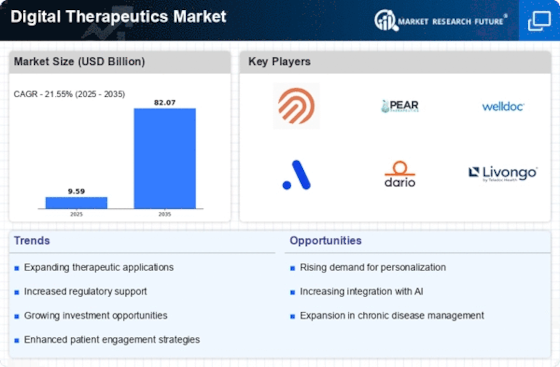Market Analysis
In-depth Analysis of Digital Therapeutics Market Industry Landscape
Constant technological innovation and the fusion of digital therapies with mobile health (mHealth) technologies are dynamically shaping the market. Enhancing user experience, extending the reach of digital therapeutic treatments, and boosting real-time monitoring capabilities are ways that software, wearables, and networking innovations influence consumer decisions. The increasing emphasis on managing chronic diseases greatly impacts market dynamics. Digital therapies are essential for addressing long-term health issues like diabetes, heart disease, and mental health disorders. They also impact market trends by offering individualized, easily accessible, and reasonably priced long-term care options. By meeting the increased awareness and need for mental health support, particularly in the context of remote and distant work, digital therapies targeting mental health issues, stress management, and well-being have an impact on market trends. Combining digital pharmaceuticals and electronic health records (EHR) shapes the market. By promoting data exchange, improving care coordination, and guaranteeing the incorporation of digital therapeutic treatments into current healthcare workflows, seamless communication with healthcare systems affects market dynamics. Employers' and payers' embrace of digital therapies for employee health and wellness initiatives defines the market. Workplace wellness programs impact market dynamics by encouraging preventive treatment, lowering healthcare costs, and addressing the more general objective of improving employee well-being and productivity. Data security and privacy concerns have a significant impact on the market. Patient data protection affects market dynamics by affecting user trust, product development, and regulatory compliance and guarantees that digital therapies meet the strictest data protection requirements. The combination of digital therapies with telehealth and remote patient monitoring greatly impacts the market dynamics. The confluence of technologies influences market trends by facilitating remote patient monitoring, facilitating virtual healthcare delivery, and enhancing accessibility to digital therapeutic interventions. Developing empirical data and results-based research for digital therapies define the market. Ongoing research activities impact market dynamics by increasing evidence supporting the efficacy of digital therapeutic interventions, influencing payment decisions, and solidifying their role. Healthcare professionals' training programs and educational endeavors greatly impact the market dynamics. Encouraging healthcare professionals to adopt and integrate digital medicines into clinical practice, efforts to raise awareness, offer training, and demonstrate the therapeutic efficacy of these treatments impact market trends. Considerations of global health disparities and the need for increased access to digital health solutions significantly influence market dynamics. Efforts to make digital therapeutics more widely accessible impact market growth and align with initiatives focused on reducing healthcare inequalities worldwide.


















Leave a Comment